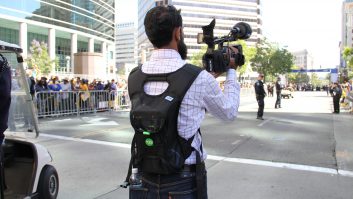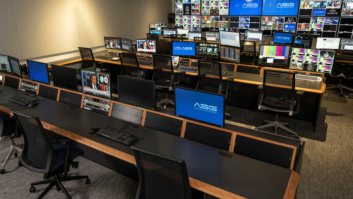A new grassroots campaign aiming to highlight the damage Brexit poses to the UK television and film industries has been launched.
TV for EU wants clarification on key points of the Withdrawal Agreement, including clarity on the Audio-Visual Media Services Directive, freedom of movement of people and freedom of movement of goods.
The campaign has been founded by industry executive Marc Risby. He tells TVBEurope he is particularly concerned about the lack of clarification around the country of origin licensing rules: “The current rules are that you have to be a European company with a significant investment in the country you’re broadcasting from to get a licence,” he explains.
“Right now, you have to prove that you’re a worthy company, you’re technically capable and a good business – which UK companies do under Ofcom, we have to do that anyway. To be part of the EU you can then apply for a broadcasting licence and you can then broadcast from your base into whichever European country you want.”
Risby says in the UK there are about 400 broadcasters with 1,200 channels broadcasting into Europe. “That’s not really mentioned in the Withdrawal Agreement,” he says. “And part of the problem there is that it comes under what you would probably class as Services. That means that those channels are at risk. Right now there is no reciprocal agreement because we have never needed to have one to broadcast into those territories. Recently Sky said if a channel is not running under a European licence it will be taken off their platform on 29th March 2019.
“I know other people have bought this up, but I want TV for EU to be a grassroots organisation shouting for our industry,” continues Risby. “What’s happening with that licence? We need as many voices as we can get. Until that’s clear, we don’t know if on 1st April 2019 whether it will be possible to broadcast out of the UK into Europe. Right now we are the dominant player in that market.”
The second big issue according to Risby is people – between 20 and 40 per cent of people within the TV and film industry are from mainland Europe and do not require a Visa. “Those people need to be protected and welcomed,” he says. “There’s also the issue around freedom of movement of people to be able to work in other European countries. Currently we have unrestricted movement so that I can go to IBC and work, or go on a job in Germany. We need to understand how that’s going to work.”
Finally, Risby wants clarification on the freedom of movement for goods: “Right now I can sell my products in whatever market I want in Europe – there are no barriers, transport issues, no duty requirements, it just all works,” he explains.
“The smoothness of that needs to be preserved otherwise there are costs involved and they need to be paid by someone.”
Risby wants TV for EU to raise the profile of issues such as country of origin licensing in the Brexit conversation. “We haven’t got a lot of time left. I’m looking for voices in our industry to say ‘Look at us, deal with us. We are a large industry, protect our rights, protect our businesses.'”
“I’m literally just starting this campaign,” he concludes. “What I am looking for at this time is for people to help shape the message and get it moving. This affects everybody – producers, broadcasters, vendors. Everyone is invited to get involved.”
To find out more about TV for EU, visit the website, follow the campaign on Twitter, or contact Marc Risby on [email protected].







